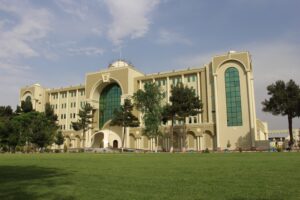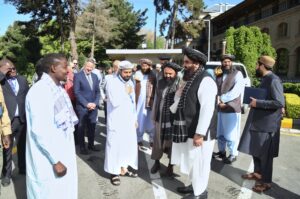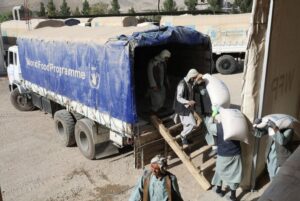KABUL (SW) – Seeking solace amid testing times, a number of women and girls have turned to tailoring to make ends meet after the banns imposed on them in the fields of education and work.
With the fall of the Republic, girls and women got deprived of education and work rights, and many went on desperate search to seek alternative ways of livelihood.
In this report, Salam Watandar interviewed 30 women who started learning sewing after the caretaker government came into effect and closed schools and universities for the females.
22 of them were students in various fields of public and private universities, four were teachers in private schools, and the other four were women who lost their jobs with the formation of the de-facto government.
19-year-old Sima Gul, who started working in a sewing workshop after schools were closed to students, told Salam Watandar: “I come to the sewing workshop out of necessity because the schools are closed. It has been almost six months since I turned to sewing, and if the Islamic Emirate wants to open the schools, we will definitely go to school again and continue our studies and we want to go to the university and follow our dreams.”
Rayhana, a resident of Kabul who also started working in a sewing workshop after schools were closed to girls, says she would like to be able to go back to school. “I came to the sewing workshop out of necessity and because I was bored at home. Before the rule of the Islamic Emirate, I went to school and if the schools were open, I would have been in the 10th grade this year. I am very hopeful that our schools will start.”
Fawzia Rashid, a student of the faculty of law and science at one of the private universities in Kabul, says that after being banned from working in international institutions and being banned from studying, she was forced to work in a sewing workshop. “I was unemployed at home and since I could no longer go anywhere to work or study, I had only one way and I chose this job because I was the only breadwinner in my house. I had to go to this sewing workshop and work and earn money because I do not have a father and I do not have an older brother either.”
Fereshta Sadozi, another resident of Kabul who became unemployed after being banned from studying, says: “It has been two months since I came to the sewing workshop. Before I came to the workshop, I was a university student, in the seventh semester at the school of Shari’at in the Department of Fiqah and Law.”
Among the interviewees in this report, there are women who lost their jobs after the de-facto government took power and she turned to sewing. Husna, one of these women, says that before the de-facto government took power, she worked in the Ministry of Urban Development. She is the sole breadwinner of her family. Husna said that she hopes to be able to earn her own income and provide for het family’s needs by working in a sewing workshop.
Sabera, another resident of Kabul, who had set up an educational center in her house before the de-facto government came into power, says that she used to pay for her family’s living expenses from the income she got, but due to her inability to get a business license, her training center was closed and she was forced to work as a tailor to earn some money.
She adds: “When I stayed at home and wanted to find something to do, I came to work at a tailor shop. There is no one who wants to go back to the past. Everyone wants to advance and I want us to move forward, and this field of ours is still good, and we hope that we will advance in this way if possible.”
A number of interviewees in this report, with a mixed feeling of sadness and hope, said that they would like to be able to return to the classroom again. Nikbakht is one of these women who is now engaged in teaching tailoring to 42 girls who are left out of school.
She said: “There are many girls here who have missed school and psychologically it has a lot of bad effects. One of our students, whose name is Ruqiya, was nearing her retirement when the Islamic Emirate came into power, and her condition deteriorated and she became extremely weak. Now, Ruqiya still wants to learn something, but she will not achieve her dreams and her future seems bleak.”
Humaira Farhangyar and Frozan Dawodzai, women’s rights activists, say that any profession can be learned at any time, but if the structure of education fails, the society will be endangered.
Humaira Farhangyar says: “Unfortunately, after the closing of the gates of schools and universities, the girls have turned to learning tailoring just to control and manage their time. If this trend continues, then they will destroy a generation. The closure of schools has caused girls to suffer from mental and emotional problems and have become victims of violence and forced marriages, and these are its unfortunate consequences. The foundation of a society is education, then we go to the profession and a person who has education can also learn the profession because the profession can be learned in any situation and at any time, but education has a specific time for each person.”
Frozan Dawodzai, also says: “In these last two years, most of the girls have not had the means to go to education. For this reason, they have turned to tailoring and other professions. Of course, the profession has its place in the industry of a country, but profession never replaces education in a society because if we want to have a professional person as per today’s global standards, they must be educated persons. Therefore, if we do not have educated people, no matter how many professionals we have, we can never replace educated people, and this can make the future of a country face serious risks.”
Meanwhile, Jamaluddin Sulaimani, an expert in the field of education, says that the place of knowledge in a society is the basis and bridge for the progress of society. “A society based on knowledge has a prosperous life and has a high level economically, socially and culturally. We can never replace knowledge with professions. In societies where women are illiterate, those societies face regression and a high poverty graph.”
Sami Ebrahimi, the spokesperson of the Ministry of Labor and Social Affairs, says that with the re-establishment of the Islamic Emirate in Afghanistan, women have been employed in various departments where they were needed.
“With the Islamic Emirate, in the sectors where women should work and it is necessary to provide services to women, in all these sectors which are considered a basic necessity, we have provided the work opportunity for women and in the sectors of education, health, passport, etc. They are active and a peaceful and good environment has been provided for them.”
In the past two years, educational and work restrictions have caused millions of people to be left out of education and activities in the educational fields, and some of them have to work in order to fill their time and escape from the psychological pressure caused by these restrictions. Many have turned to handicrafts and professions such as tailoring.
ENDS






